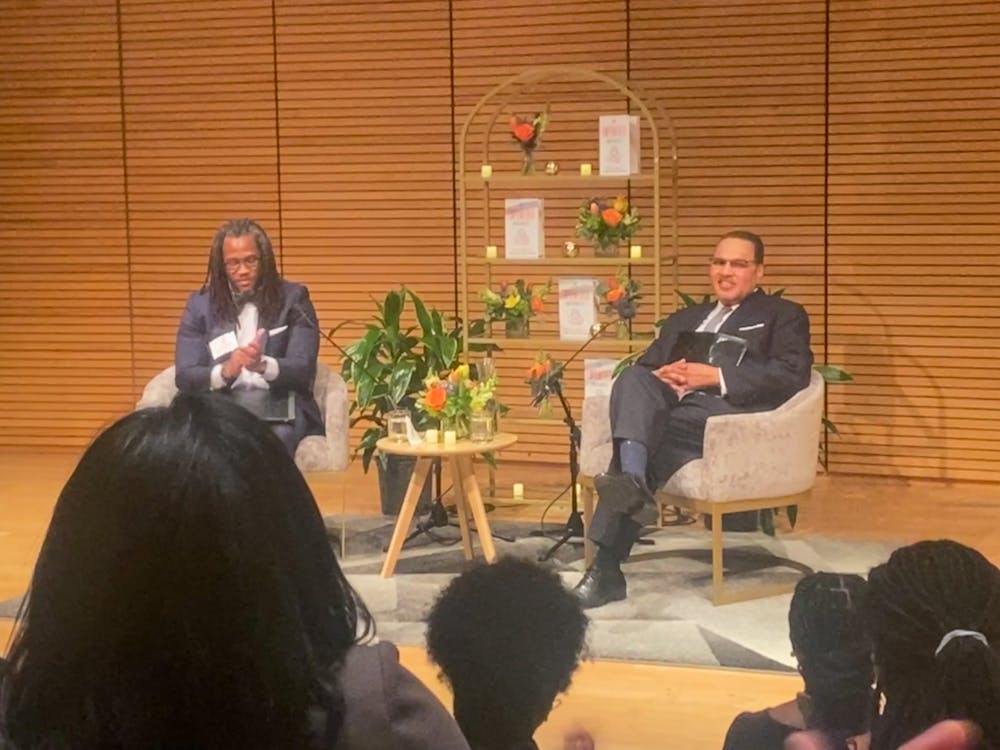Freeman Hrabowski III, president emeritus of the University of Maryland, reflected on the influence of Martin Luther King Jr. and the civil rights movement on higher education at the University’s annual Martin Luther King Jr. lecture Feb. 15.
The MLK Jr. lecture, hosted by the Office of Institutional Equity and Diversity, honors King’s legacy and commemorates his two visits to campus: one in 1960 and another in 1967, a month before he was assassinated. Recent lecturers have included Elfred Anthony Pickard, president of Wilberforce University, and Yamiche Alcindor, a PBS NewsHour journalist.
Hrabowski served as president of the University of Maryland at Baltimore County from 1992 to 2022. There, he co-founded the Meyerhoff Scholars Program, which aims to make STEM disciplines accessible for historically underrepresented students. Last year, the Howard Hughes Medical Institute honored Hrabowski by establishing the Freeman Hrabowski Scholars Program with $1.5 billion in funding for efforts to diversify the STEM workforce, according to a May 26 HHMI press release.
“When you think of Freeman Hrabowski, you think of someone who has transformed higher education,” said Sylvia Carey-Butler, vice president for institutional equity and diversity, in an interview with The Herald.
“King talked about the role of education in transforming our country in terms of access, and that's exactly what (Hrabowski) has done,” Carey-Butler said. Hrabowski “changed the landscape of STEM education in terms of historically underrepresented students” during his tenure at UMBC, she added.
Hrabowksi began his speech by discussing his childhood experiences in Birmingham, Alabama during the civil rights movement. There, he joined a group of young activists protesting against civil injustice. Hrabowski recalled being spat on by a police officer at a protest that led to his arrest.
While in jail, King visited Hrabowski, telling him that the protest “will have an impact on children who have not yet been born,” Hrabowski said.
In his lecture, Hrabowski invited the audience to reflect on past civil rights progress that has since been lost. He referenced the challenges to the proposed Advanced Placement African American history course in Florida, saying that he “never could have imagined that we would be back here again in 2023.”
The upcoming Supreme Court decision on affirmative action loomed over both President Christina Paxson P’19 and Hrabowski’s speeches at the event.
Paxson reaffirmed the University’s commitment to diversity, adding that she “firmly believes that universities are at their very best when they welcome people from the widest possible range of backgrounds and experiences.” Hrabowksi then called on the audience to fight against challenges to affirmative action “as hard as we can” through civic engagement and institutional collaboration with legal scholars.
Hrabowski said he believes that higher education — a focal point of his talk — should prepare students to think critically about complex challenges. In an interview with The Herald, he said that students should “think about the questions we haven’t even asked” and “never be satisfied with the easy answers.”
The lecture also featured three performances from the Dillard University Female Ensemble, a choral group directed by S. Carver Davenport, professor of music at Dillard. Their musical selections highlighted influential Black musicians including Thomas Andrew Dorsey, Odetta Holmes and Kirk Franklin.
Asabe Poloma, associate provost for global engagement, said that attending Hrabowski’s speech encouraged her to “envision educational spaces as spaces of transformation.”
Hrabowski told The Herald that even though King is the most celebrated American civil rights leader, remembering his legacy “really is about all the generations of people who have fought for justice. It is about the people whose names we don’t know. King is the symbol of that, but I know he would want us to celebrate all of the people from different races who fought and often gave their lives so that we could be here today.”
Correction: A previous version of this article misspelled the name of Asabe Poloma. The Herald regrets the error.

Ryan Doherty was the managing editor of digital content and vice president of The Herald's 135th editorial board. He is a junior from Carmel, NY who is concentrating in chemistry and economics. He previously served as a university news and science & research editor, covering faculty and higher education.





